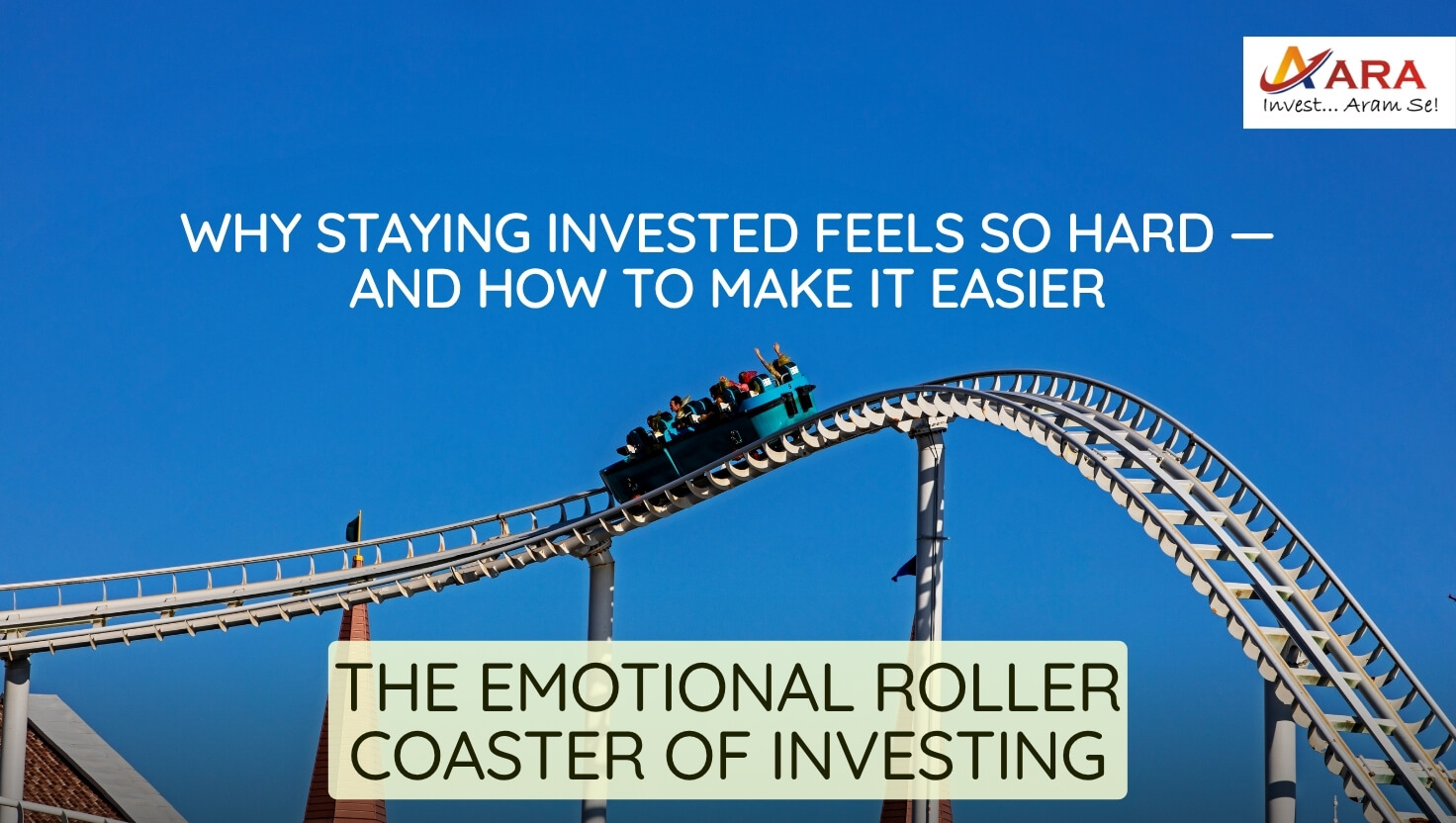“Are you sure I should stay invested?”
“Oh! I am not getting good returns, I think we should switch, what do you say?”
“The mutual fund I picked had a 5-star rating earlier, but now it doesn’t. Should I redeem it?”
“Maybe we should not have invested in this fund; let’s pull the money out.”
“Will the markets fall further?”
“Should I stop my SIP now?”
I hear versions of these doubts from nearly half of my clients. Same concern, different words. The underlying question is simple: “Am I doing the right thing by staying invested?”
Let’s consider another scenario
We’ve all heard stories of someone who bought a great stock or mutual fund, only to sell it too early, and later regret it. Or someone who kept hopping from one investment to another, chasing the next big thing, but ended up with poor returns.
People find it difficult to stay invested for a long term. I spent some time and did my research on this pattern and learnt a great deal. I am sharing my learning with you in this article, along with the tricks to overcome it.
1. Lack of a Clear Plan
In general, investors pick up the products primarily based on the historical performance without proper research and hope that similar performance will continue. So, when things go wrong, panic sets in.
What to do: Create a simple, written investment plan. Define your goals, risk tolerance, and time horizon. Divide your goals into:
• Short term (1–3 years): Emergency fund, travel, gadgets
• Medium-term (3–5 years): Home purchase, higher education
• Long-term (above 7 or 8 years): Retirement, child’s future
Then match your investments accordingly:
• A few categories of Debt funds/FDs for short-term needs
• Hybrid funds for medium-term
• Equity mutual funds for long-term growth
Read my detailed article on this here
2. We Love Certainty
Our brains are wired to avoid uncertainty. That’s why we might prefer a fixed deposit earning 5% over a mutual fund that might has a potential to give 12%. The desire for safety is natural — but it can limit long-term growth.
What to do: Let’s start small and early. Create a mix of investments, some safe, some with growth potential, some debt funds, some FDs, some equity funds, etc. As you build confidence and see how markets behave, you will become more confident and comfortable about the stock market. Since you have started early, you also have enough time to correct your course and build wealth.
3. The Emotional Roller Coaster
Money, though not tangible in itself, holds deep emotional value and is very close to our hearts. It’s natural to think we should buy at low prices and sell at high prices. It’s also natural to hope that our investments will grow quickly and double in no time. At the same time, our mind often complains why does it take so much of time to make money from money and also wonders why does it feel so difficult to be patient and wait for the money to grow. Investing takes us on a ride. When markets go up, we feel like geniuses. When markets go down, we feel like victims. The fear of losing money is so powerful that many investors sell at the worst possible time when patience is needed most.
What to do: Let’s remind ourselves that volatility is normal. Just like seasons come and go, markets rise and fall. History shows that those who stay invested through ups and downs tend to come out ahead.
4. News, Noise, and FOMO
Social media and the internet create constant noise. There’s always a new trend, the market is up today, the market is down tomorrow, crypto today, AI stocks tomorrow, gold the next week. This leads to fear of missing out (FOMO) and the feeling that “I should be doing something.”
What to do: Block out the noise. Review your investments quarterly, not daily. And don’t let headlines dictate your investment strategy. Stick to your plan and trust it.
5. Instant Gratification Vs Long-Term Goals
We live in a world of instant results like 10-minute delivery, 1-click loans, real-time updates, etc. We expect our investments also to grow instantly. But investing is different. The good returns from investment are generally delayed gratification, i.e., they take time to grow. We feel irritated and find it difficult to believe in the power of compounding.
What to do: Understand that the investments reward the patient, not the hasty. Make your long-term goals specific. Are you investing for your child’s college education? A retirement home? A world tour? Write it down. When your goals feel real, your patience gets stronger.
Get Help if Needed
Just like we go to a doctor for our health or a coach for fitness, it’s advisable to seek expert guidance for money.
A certified financial planner or mutual fund distributor can help you:
• Set clear goals
• Choose the right investment mix
• Take rational decisions during tough times
• Be a trusted companion for your financial wellbeing
Staying invested is hard, but with the right mindset, plan, and guidance, it’s absolutely possible. And the reward of staying the course is Life-changing.
Stay invested. Stay committed. Let time do its magic.

Shreedhara is the Founder & Director of Ara Financial Services Pvt. Ltd. He has an experience of over 2 decades in Financial Service Industry with majority of it in guiding individuals and institutions on their investments requirements.









